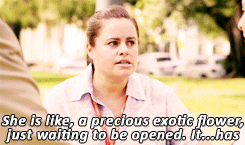Three Ways In Which Offspring’s Season Return Will Be Better Than The Federal Budget
Offspring returns for its fifth season on Wednesday May 14.

On Wednesday night, as the federal Budget coverage fades from yesterday’s screens, Channel Ten will deliver the season return of Offspring. Thousands of lounge rooms will host the next chapter in the life of the Proudman family and their many friends after the sudden death of Nina’s partner Patrick, and the birth of Patrick and Nina’s baby girl.
In some ways, Offspring is not so different to the Budget. Offspring is predictable and emotionally manipulative. It fetishises and schmaltzifies family while revealing how cruelly selective our notions of family can be. It propagates some unfortunate stereotypes (think Kim’s frumpy lesbian), and it stars one of the whitest people ever to ubiquitously appear on Australian television: Asher Keddie. The Proudmans got rich on real estate and architecture, and Nina makes the kind of cash where she can lend her sister twenty thousand bucks and it’s no big deal.

Still, Offspring grants us that little bit more surplus in the key portfolios of feels, family, and fantasy. And I don’t require any pie charts or references to belt-tightening to take you through it.
Feels:
Offspring brings with it a lot of feels. In particular, Nina’s tendency to anxiety and panic is a regular and relateable theme. Like many other heavy storylines in the show, this one is treated fairly lightly: anxiety is a serious problem, but they have fun with it from time to time. In an early episode, Billie checked in with Nina, making sure that her shallow breathing and look of slight terror was just “regular panic”, as opposed to a burgeoning anxiety attack that might require some extra support to get through. (I personally favour just being gently advised to breathe. At least fifteen times).
In the same spirit of Talking About and Normalising Your Feels, Nina and Patrick decided to go to couple-counselling when they got pregnant, to make sure they were as ready as possible to be parents together. Patrick showed little of the stereotypical male reticence in this department: going to therapy was a completely logical thing to do. He was open about his history of substance abuse, and he managed to say what he needed without inferring that Nina was a bitch or a drama queen. He and Nina are a team; it’s not just up to her to manage their emotional interaction.
In general, the men of Offspring are good at this kind of thing: they own up to vulnerability (in middle age, Darcy worries he has become redundant to his family), they support each other, they ask for time in the ‘man-cave’ without resentment, they stay at home with the baby and negotiate co-parenting, they stand with their sisters against domestic violence. Of course it doesn’t hurt that Patrick, an anesthetist, is played by the objectively handsome Matt Le Nevez.

Ladies…
–
Fantasy:
If attractive men that like babies, take responsibility for their emotions and have a ready supply of opioids is not enough for you, there’s also the scenery: the Proudmans and their friends live in the nicest parts of Melbourne’s inner city. In Offspring, everyone can afford to live in lovely Fitzroy, close to friends, family and work — each location is a picturesque stroll or an entertaining car ride away.
The business of reproduction is similarly easy: at the hospital where Nina is an obstetrician, births happen in rooms full of women, far from the stress and disaccord that can so often attend labour in public hospitals. Kids are raised by the village, as the upcoming co-parenting plot will doubtless demonstrate in a new way. Offspring‘s vision of family and community might be neurotic, but there are many lush and generous aspects too. Also, Clare Bowditch is there.
–
Family:
In Offspring, family looks so much more like our own homes than those imagined by our politicians (there’s nary a white-clad Abbott daughter in sight). It reflects the reality of family diversity: parents are single, same-sex, non-biological; people in their fifties and sixties have sex and break up and smoke pot and disappoint their adult children; siblings are co-dependent, demanding, and chaotic; friends are judgemental, intimate and often interfering. People lose their jobs, survive partner abuse, are unfaithful, are self-destructive. A pregnancy is lost, a baby is stillborn, another is premature.
It’s a shame that Offspring is so white, because there’s a real opportunity for it to take its show of the diversity even further. (Although, in a move beyond tokenism, Cherie — played by Deborah Mailman — doesn’t have to perform her Aboriginality to be an awesome Aboriginal woman on prime time.
The Budget will have little for you in the critical areas of feels, fantasy and family. Sometimes, it is only TV that can fill the deficit.
–
Offspring returns to TEN for its fifth season on Wednesday May 14, at 8.30pm. Watch the first scene below:
–
Ann Deslandes is a writer and social researcher in Sydney. She has degrees in sociology and gender studies, which makes her very annoying to watch TV with.
